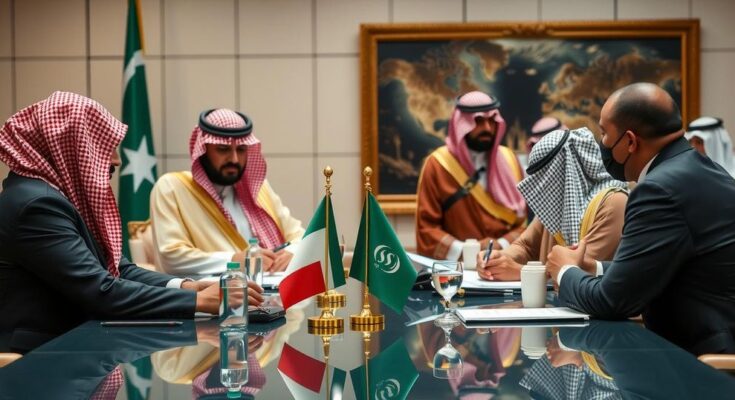Diplomats from Arab nations and Europe met in Riyadh to discuss support for Syria following the ousting of Bashar al-Assad. The discussions involved various stakeholders, aiming for stability and potential sanctions relief as the new Syrian leadership seeks to address humanitarian needs. Saudi Arabia’s role in these talks underscores its strategic shift in navigating the complexities of Syrian politics and regional influence.
On Sunday, diplomats from the Arab nations and Europe convened in Riyadh to deliberate on support for Syria following the recent ousting of Bashar al-Assad. This gathering is significant as Saudi Arabia, eager to bolster its influence in Syria, hosted separate sessions for Arab officials and broader international stakeholders, including the EU and the United Nations. Ahmed al-Sharaa, the new Syrian leader and head of the rebel coalition responsible for Assad’s removal, is advocating for the alleviation of sanctions imposed by Western nations due to Assad’s violent repression of protests in 2011, which ignited a devastating civil war that has led to immense human suffering and the displacement of millions.
Saudi Arabia’s renewed engagement with Syria comes after a historic Arab League meeting in 2023 welcomed Assad back into the fold, demonstrating a strategic shift in regional politics. The current discussions aim to outline a transition plan that encourages a government inclusive of all minorities and adherent to human rights standards. With military engagements ongoing, the focus remains on ensuring stability while addressing humanitarian needs as Riyadh dispatches aid to Syria.
The talks reflect a continuity of diplomatic efforts initiated in Jordan and echo calls for a Syrian-led government that is representative and transparent. However, uncertainties abound regarding the extent of commitment Saudi Arabia is willing to make amid the existing sanctions that complicate effective governance. The cautious stance adopted by Saudi diplomats contrasts sharply with the more aggressive re-engagement strategies taken by Turkey and Qatar, who have been quicker to re-establish diplomatic relations with Damascus.
As the meeting progresses, the outcome remains to be seen, and the international community will be closely monitoring Saudi Arabia’s potential role in facilitating Syria’s recovery. There is apprehension surrounding the influence of the successor leadership on extremist factions within Syria and whether their governing strategies can indeed foster long-term stability in a nation torn apart by conflict.
The diplomatic discussions taking place in Riyadh represent a critical juncture in regional efforts to address the ongoing crisis in Syria, which has endured a brutal civil war since 2011. The transition of power following the fall of Bashar al-Assad has opened doors for new leadership under Ahmed al-Sharaa, leading to a re-evaluation of international sanctions and the broader geopolitical landscape in the Middle East. Saudi Arabia, having long opposed Assad, is now looking to assert its influence in shaping the future of Syria while grappling with the remnants of past hostilities and the pressing need for humanitarian support.
In conclusion, the assembly of diplomats in Saudi Arabia marks a pivotal step in the international community’s quest for a constructive approach to Syria’s future. While Saudi Arabia aims to solidify its leadership role in facilitating a stable transition, the challenges of securing cooperation from the new Syrian administration and ensuring compliance with human rights commitments remain significant. The outcome of this dialogue will likely have far-reaching implications for both regional stability and international relations in the context of post-Assad Syria.
Original Source: www.france24.com




